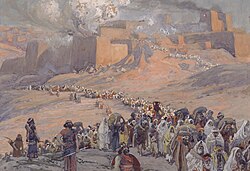
Isaiah sets forth the conditions by which the Jews will
return to holy land. He also delineates a shadowy figure, separately defined as
the Messiah, the Suffering Servant or merely an allegory describing the
Israelite people as a heroic symbol who survives through God’s unique power.
Rabbi: The people are
being prepared for the return to Israel.
Bob: We never measure up, so why are we redeemed?Rabbi: Our deliverance from exile is not dependent on our actions. This was God’s promise to Israel.
Bob: In response to 52:4-5 “My people went down/ to Egypt to
sojourn there;/ But Assyria has robbed them,/ Giving nothing in return./ What
therefore do I gain here?” “What do I
gain here?” God has made this all happen! The sins that seem to bother God are
worse than failing to observe the laws of kashrut.
Ellen: In response to 52: 1 “For the uncircumcised and the
unclean/Shall never enter you again.” What makes people unclean?
Rabbi: Menses, nighttime emissions, the uncircumcised…
Ellen: Is there a ritual way to become clean?
Joel: Yes, the mikvah. Men and women both use it in ancient
times.
Ceil: To rejoin the congregation you must become clean.
Bobby: I’m reading from a 1917 JPS translation and it’s a
different read. Instead of “unclean” it says “impure”.
Bob: Is the departure from Babylon sanctioned by Cyrus? Does
he say they can leave?
Ceil: The exiled were not in abject slavery in Babylon.
Rabbi: Yes, this is not like Egypt where we couldn’t wait to
leave. Isaiah is a bit of a P.R. man. He is trying to entice the people to
leave. He appeals to them by claiming that only the “righteous” can leave,
maybe using this as a way to rally them to leave Babylon.
Ellen: People are making a choice!
Joel: In response to 52:13 “Indeed, My servant shall
prosper,” For Christians this is a seminal text. They see the Suffering Servant
as a reference to Jesus who is born 500 years after Second Isaiah.
Ellen: It seems to be describing some kind of immortal. It
seems superhuman or some kind of daemonic presence.
Joel: Scholars say Isaiah is just describing an
anointed Jewish king or the suffering people of Israel. The ancient Hebrews saw
God as a God of awe. When Moses saw God’s face he glowed and radiated. In the
Isaiah passage perhaps, we are seeing an attribute of God himself.
It may not be pretty, nice or neat. His righteousness can be terrible.
Rabbi: Sometimes we need to remind ourselves that we are
interpreting from a modern perspective.
Interpretation of the prophetic language, at times, can be seen in
various ways. Is Isaiah referencing a nation or an individual?
Ceil: I think the concept of a messiah must have been
brewing. The people were searching and had a need for a Messiah as cruelty
increased by our captors, the Babylonians, the Greeks and the Romans.
Joel: There have been many Jews who have claimed to be the Messiah.
Bar- Kochba is the most famous one from ancient times.Ellen: This all predates Freud, but it sounds a lot like Freud. The individual struggles with the forces inside h/herself. It is the reason why we can’t get there. There is an evil impulse. The whole description feels a bit drug- like, like an internal battle.
Joel: The prophets are the super-ego. They yell and scream. They represent a new kind of leadership. They don’t lead through political means, but by moral example.
How is it that we are one hundred and nineteen pages into
the book of Isaiah and we have not discussed the structure of the prose?
Reading Isaiah is like trying to hold sand in your hand with your fingers
outstretched. Yes, Isaiah is written in poetic meter to which I am not
accustomed, but I believe the Isaiah writers had the intention of decentering the
reader for a very specific purpose. Straightforward prose structures events
within a time frame that encapsulates a beginning, middle and an end. The
Isaiah writers were not content with this form and chose another that was
better suited to simultaneously elucidating history, time and God concepts. Conventional
words can be used to attempt a description of God and his deeds, but I think
these writers are trying to achieve something more than this. The techniques
they utilize work to disorient the reader and strip away h/her expectations of
an ordered and predictable universe. They achieve this in several ways. The
reader is transported back and forth through centuries of Jewish history via
Isaiah’s prophetic visions. God also references our forebears, (Jacob and
Abraham) moves into the “present” (the Babylonian Captivity) then forward into a
redemptive future of some unspecified time. The narrator’s voice continuously
shifts between Isaiah, God and the Children of Israel which blurs the
boundaries between them as seperate entities. When the Messiah or its equivalent is evoked, we
have no reference point for decoding its meaning or identity. The nation is referred to by many names such
as, Children of Israel, Jacob, Jerusalem, Zion, the Bride, and Woman.
Imagine looking through a window with a
translucent pane of glass and a half inch hole in it. A dramatic event is
occurring on the other side of the glass, but details are impossible to ascertain. If you look through the hole there is a clearer
vision of the outside world, but your vision is limited through a tiny perspective.
Paradoxically the disjuncture of language employed in the Book of Isaiah actually
functions to give the book its special meaning. Like people groping before a
frosted glass, we are frustrated, confused, searching for meaning and equilibrium. As we read from
the text we ask ourselves, “Who will come along and explain to us what we
cannot understand? Who will assist us in expanding our limited perspective?


